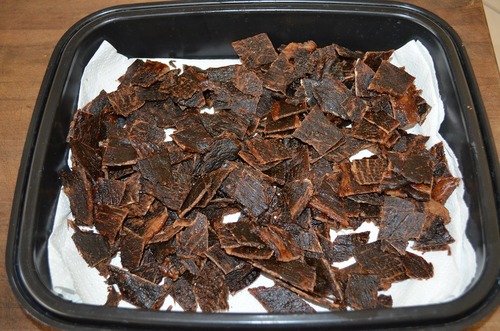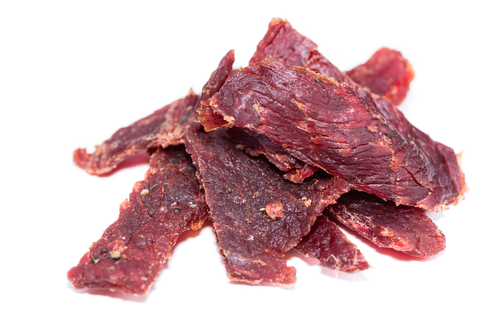Short answer
Beef jerky purchased from the store is typically bad for you. Such varieties contain high amounts of sodium and harmful preservatives. If you are going to consume beef jerky, we recommend purchasing a variety free of preservatives and produced using organic, grass fed meats.
Recommended Alternative
Long answer
Beef jerky is a type of cured dried meat that is a popular snack in North America. It originated in Native American tribes as a way to preserve meats. The word “jerky” comes from a Quechua word, “ch’akari,” which means, “salted meat.” The process of making beef jerky is very simple. A cut of meat is dehydrated and salted in order to preserve it. The salt not only gives the meat its flavor but also prevents the meat from going bad for months. During the dehydration process, beef jerky is stripped of most of its fat, and bacteria are eliminated from the meat.
Beef jerky has been receiving some light praise lately because of its high protein and low fat content. When the water content is removed from the beef during the dehydration process, its protein content usually doubles. One ounce of beef jerky usually contains around 9 grams of protein, depending on the brand. However, a high protein snack comes at a price: because of its preservation process, beef jerky contains high amounts of sodium. Depending on the brand, beef jerky can contain anywhere from 400 to 600 mg of sodium per serving size. The high intake of sodium can have negative effects on a person’s health and can, in the long-term, lead to cognitive degeneration, kidney damage, high blood pressure and heart problems. The American Heart Association recommends that adults do not exceed 1,500mg of sodium a day.
Beef jerky also contains sodium nitrate. Sodium nitrate can be toxic in large amounts. It is a chemical preservative that prevents the growth of bacteria and adds color to meats, making them look appealing and fresh. A High intake of sodium nitrate may lead to methemoglobinemia, a condition in which red blood cells can no longer transport oxygen in your body. Furthermore, the American Medical Association links sodium nitrate with increased risk of stomach and brain cancer. Beef jerky also contains MSG, an ingredient added for its flavoring abilities. MSG, or monosodium glutamate, can cause short-term side effects such as nausea, headache, chest pain, sweating, flushing, and more. MSG, according to studies by BMC Neuroscience, activates the taste buds in the mouth that help release serotonin in the brain, making salty snacks like beef jerky addictive.
Although beef jerky is a good source of iron and zinc, if the jerky is a marinated type, it will contain large amounts of sugar, depending on the recipe. Over-intake of this snack may lead to weight gain, high blood pressure, and heart problems. Beef jerky should only be consumed in moderation and the consumer should try to find the most natural and less harmful variety.
Possible short-term side effects
- msg effects include:
- nausea
- headache
- chest pain
- sweating
- flushing
- indigestion
Possible long-term side effects
- increased blood pressure
- increased cholesterol
- weight gain
- cardiovascular disease
- stroke
- cancer
- methemoglobinemia
Ingredients to be aware of

Benefits
- source of protein
Healthier alternatives
- buffalo jerky
- homemade beef jerky
- organic beef jerky free of preservatives
Our Wellness Pick (what is this?)
Louisville Vegan Jerky
- High in protein
- Vegan-friendly snack
- Gluten-free ingredients
- Includes diverse flavors
- Non-GMO
 Approved by
Approved by 















